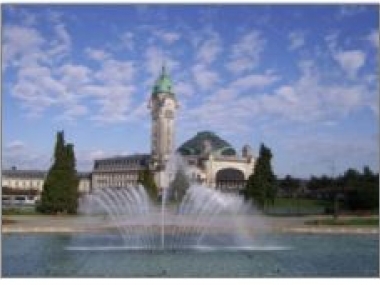UNIC project brings lasting benefits for Limoges - Interview
Edited on
09 October 2017Sylvette Duterne works in the French city of Limoges, Lead Partner of the URBACT project Urban Network for Innovation in Ceramics - UNIC. UNIC's objective was to foster innovation in the ceramics industry in cities where ceramics constitutes an historical inheritance. The project completed its programme of exchange and learning activities in July 2011. A few months after the end of the project, Sylvette Duterne explains the main benefits her city gained from her participation in URBACT.

What have been the benefits for your city from its participation in URBACT?
Clearly the URBACT methodology was a strong asset for Limoges: The Local Support Group framework initiated a culture of "working together". Elaborating a ![]() Download UNIC Local Action Plan of Limoges (572.27 KB) was also new to us: the definition of this roadmap based on the Lead Expert’s inputs enabled to run an in-depth diagnostic on our territory. Moreover, stakeholders in the field of European ceramics had the opportunity to meet thanks to URBACT.
Download UNIC Local Action Plan of Limoges (572.27 KB) was also new to us: the definition of this roadmap based on the Lead Expert’s inputs enabled to run an in-depth diagnostic on our territory. Moreover, stakeholders in the field of European ceramics had the opportunity to meet thanks to URBACT.
In comparison with other programmes, URBACT focuses on urban development by developing a truly cross-cutting approach. Then running an integrated urban development strategy becomes possible: we can address many sectors at the same time: industry issues, territorial marketing aspects etc.
In your Local Action Plan (LAP), one of the actions recommended is to create a Ceramics Council in Limoges such as the one that exists in Stoke-on-Trent. Has this process started?
Our final objective is to create such an assembly that would gather all ceramics local stakeholders, but it has not been formally created yet.
Connecting global and local actions is the main challenge. It is true there are some barriers: different languages and above all the necessity of coordinating all different interests at European level!
Moreover convincing everyone of the necessity to unify all these different interests is long and difficult: acting on global and local level are two distinct approaches that needs to run in parallel.
Does Limoges plan to develop some territorial marketing actions such as in Delft (UNIC Partner)?
We became aware that developing territorial marketing was a coherent approach. The global strategy developed by Delft is truly a best practice we want to inspire from.
Some punctual events related to fire arts have been organized in Limoges in relation with fire arts (through a biennial exhibition, gastronomy etc). Besides, we need to get ceramics more visible in our streets, and we want to help developing new profitable business markets (in the field of luxury, perfumery etc.). So yes, many actions have been taken but we need to formalize a strategy in terms of territorial marketing.
Now that the UNIC project is finished, how will Limoges continue promoting ceramics?
We keep on working collectively at European level since all UNIC partners have created together a formal administrative structure (association loi 1901). This new organisation is based in Limoges and gathers all UNIC partners to continue our activities dealing with ceramics. At local level, we keep on working with our former UNIC partners on European calls for tenders.
Regarding the Local Action Plan, our flagship project is the creation of a World and of a European Route of ceramics. We are already working with partners from China and Turkey on these projects. These projects have a truly cross-cutting approach: the world ceramic road will involve economic exchanges between companies, academic exchanges between students, a specific tourism strategy etc. So this project is a global initiative, and we want this initiative to gather cities which have in common their historical inheritance of ceramics. This aspect will also be promoted through the European Route of Ceramics, which aims at creating a network of local routes linking cultural, industrial and artistic sites focusing on the theme of ceramics.
Finally in terms of innovation, we are planning to promote the European centre of ceramics in the framework of our Local Action Plan and the Ceramics Council at local level as explained earlier. One of the LAP’s objectives is to help ceramics companies finding new markets; we would also like to focus on the definition and promotion of the cultural identity of ceramics, and we try to enhance the use of ceramics into urban spaces, among other actions.
Read more:
- UNIC - URBACT website
- UNIC Final Results - URBACT website
 Download UNIC Local Action Plan of Limoges (572.27 KB) - PDF
Download UNIC Local Action Plan of Limoges (572.27 KB) - PDF
Submitted by admin on




